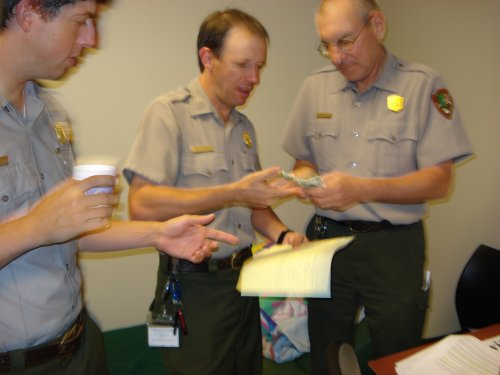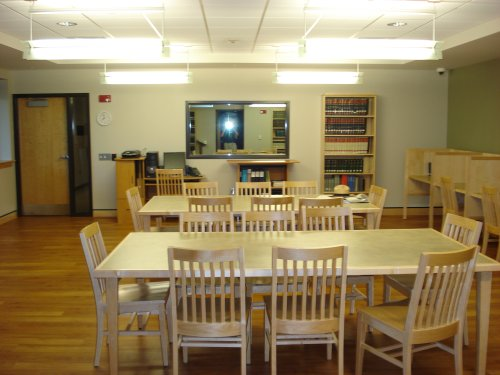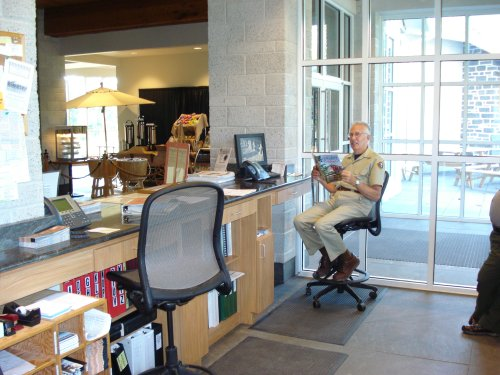David Hadley ’09 interns as an NPS Interpreter
Over the past few years, the Gettysburg National Military Park has been going through many new and exciting changes, one of the most obvious of which is the new Visitor's Center. I was one of the first interns to have the privilege of working in this facility. This past summer, my fellow interns, Dave Moyer, Adrienne Robertson, Joseph Philips, and I were given many different tasks and responsibilities to help operate the Center and the park. These tasks varied greatly, but all allowed us to work the frontlines of a major historical institution.
 One of my prime responsibilities was as an interpreter for the park. Over the course of the summer, each intern was expected to prepare and give at least two programs to the public, with the possibility of a third. Right off the mark, we were given access to the new library facilities to research our programs. The library is impressive in and of itself for the abundance of primary source material on the battle, along with a solid number of secondary sources on the battle and on the war. My first program was on the Soldier's National Cemetery, to be given about two weeks into my internship. I was helped greatly by both the permanent and seasonal rangers, all of whom were very welcoming to the new people on the staff and provided useful advice and encouragement, especially my supervisor, Eric Campbell, and the Park Supervisory Historian, D. Scott Hartwig.
One of my prime responsibilities was as an interpreter for the park. Over the course of the summer, each intern was expected to prepare and give at least two programs to the public, with the possibility of a third. Right off the mark, we were given access to the new library facilities to research our programs. The library is impressive in and of itself for the abundance of primary source material on the battle, along with a solid number of secondary sources on the battle and on the war. My first program was on the Soldier's National Cemetery, to be given about two weeks into my internship. I was helped greatly by both the permanent and seasonal rangers, all of whom were very welcoming to the new people on the staff and provided useful advice and encouragement, especially my supervisor, Eric Campbell, and the Park Supervisory Historian, D. Scott Hartwig.
 After giving my National Cemetery program a few times, Eric Campbell allowed me to prepare my second, focusing on the Aftermath of the battle. I was helped by the fact that not only were the written resources of the park impressive, but so was the expertise of its personnel. I was able to talk directly to an expert and author of several books on the aftermath, Gregory Coco. Because of the help I received, I was able to complete and begin giving my program in about a week. In addition to "in-house" research and preparation, I also gained experience from "roving," or being tasked to go over a certain area of the field, making myself available to visitors for one-to-one interpretation. It was a great place to practice and fine-tune a program while interacting with the public on a more personal level. Fortunately, I still had enough time to give a third program, focusing on Pickett's Charge.
After giving my National Cemetery program a few times, Eric Campbell allowed me to prepare my second, focusing on the Aftermath of the battle. I was helped by the fact that not only were the written resources of the park impressive, but so was the expertise of its personnel. I was able to talk directly to an expert and author of several books on the aftermath, Gregory Coco. Because of the help I received, I was able to complete and begin giving my program in about a week. In addition to "in-house" research and preparation, I also gained experience from "roving," or being tasked to go over a certain area of the field, making myself available to visitors for one-to-one interpretation. It was a great place to practice and fine-tune a program while interacting with the public on a more personal level. Fortunately, I still had enough time to give a third program, focusing on Pickett's Charge.
 My duties to interpretation, however, were only a part of the internship. Another main component was working the Visitor’s Center desk. This summer was a particularly interesting time for those on the desk since we were the frontline in dealing with Visitors’ reaction to the new center. Many individuals complimented us on the new building and new museum, which attempted to more clearly tell the story of the war than focus purely on artifacts. Some visitors were of course very displeased that the Center had changed, and were a very vocal minority. Despite, or perhaps because of, this frustration, the desk served as a valuable way to gain experience working and talking with the public on a one-to-one basis.
My duties to interpretation, however, were only a part of the internship. Another main component was working the Visitor’s Center desk. This summer was a particularly interesting time for those on the desk since we were the frontline in dealing with Visitors’ reaction to the new center. Many individuals complimented us on the new building and new museum, which attempted to more clearly tell the story of the war than focus purely on artifacts. Some visitors were of course very displeased that the Center had changed, and were a very vocal minority. Despite, or perhaps because of, this frustration, the desk served as a valuable way to gain experience working and talking with the public on a one-to-one basis.
My internship was valuable to me for both its demands in research and in relations with visitors. My research skills were put to the test, and the work I performed to prepare my programs for the public was both challenging and rewarding, ultimately making me a better researcher for it. Perhaps even more valuable was my experience with the public. Though at times frustrating, it framed the fact that history cannot and does not exist in a vacuum, and the most challenging thing for a Historian might not be the research itself, but finding a way to express that research to the public. Overall, my internship this summer was extremely rewarding, and its lessons will continue to impact my career in the field of history.


